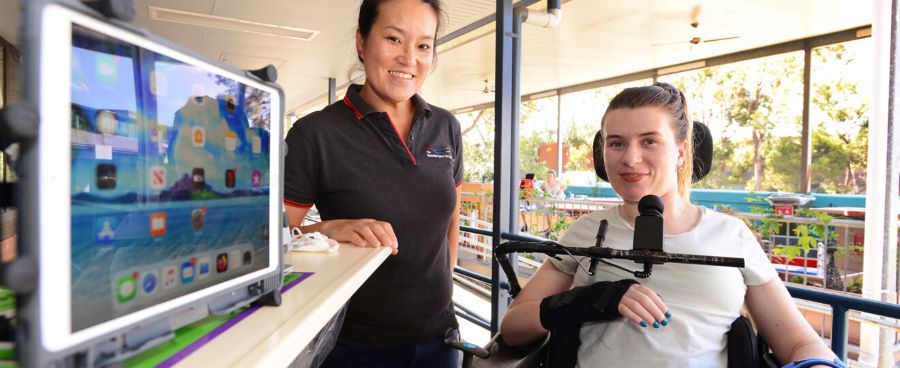Growing Assistive Technology Solutions in Queensland: A collaboration with the National Injury Insurance Agency Queensland (NIISQ Agency).
About the Project
Researchers from the Hopkins Centre, in partnership with the NIISQ Agency, have been investigating Assistive Technology (AT) provision in Queensland and the current needs from multiple stakeholder perspectives. Needs and solutions were explored, with the aim of achieving better outcomes for people with disability.
Project Details
This mixed method needs assessment engaged with a range of stakeholders to examine the current practices and needs regarding AT provision throughout Queensland. This exploration considered low-tech devices through to complex systems in three phases:
Phase one: engaged with publicly available documents and interviews with representatives from regulatory bodies, agencies, and schemes in Queensland and nationally to establish the normative and comparative need.
Phase two: involved an online survey and subsequent focus groups and interviews with AT advisors and suppliers in Queensland to establish the expressed need.
Phase three: engaged with recipients of AT via an online survey and interviews to establish the felt need.
The project culminated in a solution-building workshop with the project advisory group and other key representatives to develop strategic and operational priorities for translation of the findings.
The NIISQ Agency provided funding to support the Growing Assistive Technology Solutions in Queensland project to conduct research that aims to improve the health and quality of life outcomes for NIISQ participants.
Project Aims
The aims of the study were to (1) conduct a needs assessment establishing the Normative, Comparative, Expressed, and Felt Needs of funding body representatives, service providers/health professionals, and recipients of assistive technology; and (2) to integrate and interpret the information to inform future actions that can be integrated within AT services such as HabITec and supported for implementation across Queensland.
Project Significance and Outcomes
The study gained a comprehensive understanding of the needs of all stakeholders involved in the provision of a range of assistive technologies across a diverse range of services and funding models. Three main pressure point were identified:
- There is a need for greater transparency and more information available from agencies, schemes, and suppliers.
- There is an urgent need for capacity and capability development of service providers in Australia.
- There is a call for improved access to assistive technology for trial and hire.
The solution-building workshop identified eight priorities for action including roles for people with lived experience in the AT sector. Please see the below summaries, which provide an outline of outcomes for each phase of the study and the solution building workshop.
Project Outcomes
This project is now complete. Please see the below summaries, which provide an outline of the project outcomes.
![]() Growing AT Solutions in Queensland – Expressed Need from AT Advisors and Suppliers
Growing AT Solutions in Queensland – Expressed Need from AT Advisors and Suppliers
![]() Growing AT Solutions in Queensland – Felt Need from AT Recipients
Growing AT Solutions in Queensland – Felt Need from AT Recipients
![]() Growing AT Solutions in Queensland – Solutions
Growing AT Solutions in Queensland – Solutions
Publications
Hogan C, Gustafsson L, Di Tommaso A, Hodson T, Bissett M, Shirota C. Establishing the normative and comparative needs of assistive technology provision in Queensland from the agency and funding scheme perspective. Brain Impairment. 2023;24(2):204-218
Hodson, T., Gustafsson, L., Bissett, M., Hogan, C., Shirota, C., & Di Tommaso, A. (2024). Understanding the experiences and needs of assistive technology users in Queensland. Disability and Rehabilitation: Assistive Technology, 1–10.
Gustafsson, L., Shirota, C., Di Tommaso, A., Hodson, T., Hogan, C., & Bissett, M. (2025). Perspectives and needs of assistive technology advisors and suppliers in Queensland, Australia. Disability and Rehabilitation: Assistive Technology, 1–10.
Aplin, T., Gustafsson, L., Hogan, H., Owens, M., Boyd, H., Hodson, T., Shirota, C., Bissett, M. (2024). Co-designing solutions for assistive technology service provision in supported housing: Outcomes from participatory research. Health Expectations, 27(2), 480-494.
Aplin, T., Gustafsson, L., Hogan, C., Owens, M., Boyd, H., Hodson, T., Shirota, C., & Bissett, M. (2025). Codesigning solutions for assistive technology service provision in Queensland, Australia. Health Expectations, 28(3), e70322.
Project Funding
The NIISQ Agency provided funding to The Hopkins Centre to support the Growing Assistive Technology Solutions in Queensland Project to conduct research/activities that aim to improve the health and quality of life outcomes for NIISQ participants.
![]()
![]()

Image above: Soo Oh, HabITec Clinical Research Lead working together with citizens in The Hopkin Centre HabITec Project.
View All Researchers

